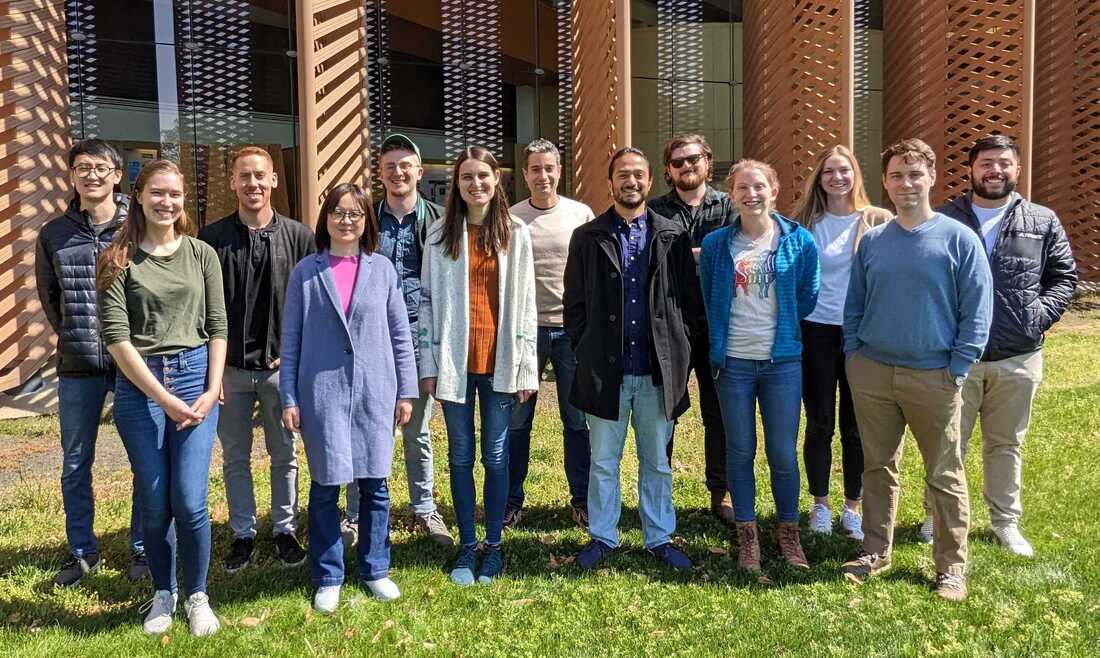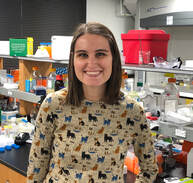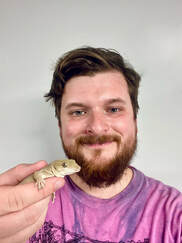|
LAB MEMBERS
|
Left to Right: Jongbeom Park, Ella Kaage, Matt Johnson, Sha Li, Ben Brack, Sarah Mereby, Ricardo Mallarino, Harsha Sen, Aaron Griffing, Fiona Logan-Sankey, Megan Rothstein, Forrest Rogers, and Jorge Moreno
PRINCIPAL INVESTIGATOR
LAB MANAGER/RESEARCH SPECIALIST
|
Sarah Mereby - smereby(at)princeton.edu
Sarah is a Research Specialist in the Molecular Biology department. She received her M.S. in Genetics and Molecular Biology from Emory University where she studied non-primate lentiviruses. She also received her B.S. in Biology from The College of New Jersey. Sarah has always been fascinated by genetics and the regulation of gene expression. |
POSTDOCS
|
Dr. Aaron Griffing - ag3200(at)princeton.edu
PRFB Fellowship (NSF) Aaron’s research aims to uncover how development is altered on evolutionary scales to produce morphological diversity in reptiles. He completed his PhD in 2022 from Marquette University, under the advisement of Dr. Tony Gamble, where he studied evo-devo of convergent gecko morphologies. Currently, Aaron is studying the genomic basis of lung diversity in tetrapods and lizard gliding structures. He is currently co-advised by Dr. Celeste Nelson in the Princeton Dept. of Chemical & Biological Engineering. |
GRADUATE STUDENTSUNDERGRADUATESFACULTY ASSISTANT |
Dr. Forrest Rogers - fr1510(at)princeton.edu
F32 (NRSA) Fellowship (NIH) Forrest received his PhD in 2020 from the University of California, Davis. His doctoral work, completed under the advisement of Dr. Karen Bales, investigated how compositional variation in early life parenting structures alters biobehavioral development in socially monogamous and biparental prairie voles (Microtus ochrogaster). As a trainee in the NIMH-sponsored (T32) Bay Area Affective Science Training Program, he completed additional training in human psychophysiology under the advisement of Dr. Wendy Berry Mendes at the University of California, San Francisco. Forrest completed his B.S. in Biological Science (College & Departmental Honors) and his B.A. in French from Oklahoma State University. Forrest is principally interested in elucidating the neurobiological causes and biobehavioral consequences of parental care. He is co-advised by Dr. Catherine Peña at Princeton Neuroscience Institute. Dr. Megan Rothstein - mr6463(at)princeton.edu
F99/K00 Fellowship (NIH) Megan's research interests lie in understanding the developmental basis underlying phenotypic novelties observed across the animal kingdom. She received her PhD from Cornell University, where she studied gene regulatory networks controlling neural crest formation under the direction of Dr. Marcos Simoes-Costa. Currently, she seeks to combine experimental embryology and comparative genomics approaches to uncover the molecular mechanisms governing variation in avian bill morphology. Ben Brack - bbrack(at)princeton.edu
Ben is a graduate student in the Department of Molecular Biology. He received his B.A in Biology from Cornell University studying the genetic basis of red pigmentation in butterfly wings and later returned to Cornell as a technician working on the evolution of facial recognition in paper wasps. Ben is generally interested in how developmental mechanisms shape and constrain the emergence of novel traits, and how these can influence convergent evolution. He is using genomic and molecular approaches to explore how stripe patterns are established in the African Striped Mouse (Rhabdomys pumilio) and the Thirteen Lined Ground Squirrel (Ictidomys tridecemlineatus). Jiyoung Kang - jiyoung(at)princeton.edu
Jiyoung is a graduate student in the Department of Molecular Biology. She received her B.A. from Yale University. She is broadly interested in dynamic patterns and plans to study melanocyte development in the African Striped Mouse. In her free time, she likes to read, solve puzzles, and enjoy other sedentary hobbies. Jiyoung is co-advised by Dr. Danelle Devenport Jongbeom Park - jongbeom(at)princeton.edu
Jongbeom is a graduate student in the Molecular Biology department. He received a B.A. from Grinnell College where he studied fungal reproduction and the ecological basis of sex-limited color dimorphism in hawaiian damselfly. He also worked on color polymorphism in African killifish at the Max Planck Institute for Biology of Ageing. With his broad interest in evolutionary and developmental biology, Jongbeom is currently using multi-omics approach to investigate the development of marsupial immunity. Jongbeom is co-advised by Dr. Mohamed Donia. Harsha Sen - hs2508(at)princeton.edu
Harsha is a graduate student in the Department of Molecular Biology. He received his B.A. in Biology and Economics from Swarthmore College where he worked on modeling speciation dynamics during the Cambrian explosion, and on investigating the conservation of pericentric satellite repeats in great apes. He also studied paralogy in the dual genomes of the ciliate Oxytricha trifallax. After graduation, he worked in Steve McCarroll’s lab on developing single-cell, single-virion approaches for high-throughput inference of synaptic connectivity. Harsha is broadly interested in understanding biological systems from evolutionary and genomic perspectives by developing and using computational and molecular tools. Harsha plans to investigate the functional evolution of gliding and flying membranes in mammals using computational and high-throughput molecular approaches. Fiona Logan-Sankey - fionasl(at)princeton.edu
Fiona is an undergraduate student in the Molecular Biology department. She is working on her senior thesis with Ben studying the genetic basis of periodic patterning in African striped mice. She previously worked with the Rubenstein lab in the Princeton Department of Ecology and Evolutionary Biology studying cattle-zebra interactions in rangeland landscapes and interned in a liver cancer lab at the Institut de Génétique Moléculaire de Montpellier in Montpellier, France. Outside the lab, she is a member of the Princeton Running Club, plays clarinet in Sinfonia (an on-campus orchestra), and enjoys observing striped animals in their natural habitat. Nora Shefferman - norashefferman(at)princeton.edu
Nora is an undergraduate student in the Department of Molecular Biology. She is very interested in gene regulation, especially in evolution and development. Currently, she is working with Aaron to investigate the mechanisms of patagium formation and evolution in gliding geckos in comparison to mammalian patagia development. On campus, she also works at the McGraw Center for Teaching and Learning as a tutor and advises first year students in the New College West residential college as a Peer Academic Adviser. Taso Callanan – taso.callanan(at)princeton.edu Taso is an undergraduate in the Department of Molecular Biology. He is interested in interdisciplinary approaches to understanding the biological mechanisms of behavior through the study of evolution, molecular biology, and neuroscience. He is currently working under Forrest to elucidate the impact of early life stress on parental behavior in African Striped Mice. Outside of the lab, Taso is a member of the Princeton University Men’s Swimming and Diving team and a Peer Academic Advisor for Mathey College. Galo Guerrero - gguerrer(at)princeton.edu
Office: SCH 419 Tel: 609-258-2933 |
Past members and their current positions
- Yafei Mao (Visiting PhD student); Currently: Group leader in Shanghai Jiao Tong University, China
- Lydia Zhong (Undergraduate student) Currently: Ophtalmology Residence, UCLA
- Ares Alivisatos (Undergraduate student) Currently: Research Technician, Tufts University
- Ella Kaage (Undergraduate student) Currently: Research Technician, Harvard University
- Charles Feigin (Postdoc) Currently: Group leader, Latrobe University (Australia)
- Matt Johnson (Postdoc) Currently: Research Scientist, Bristol Myers Squibb
- Sha Li (Postdoc) Currently: Biotech Startup, China
- Jorge Moreno (PhD student) Currently: Postdoctoral Fellow (Stowers Institute, USA)
- Yafei Mao (Visiting PhD student); Currently: Group leader in Shanghai Jiao Tong University, China
- Lydia Zhong (Undergraduate student) Currently: Ophtalmology Residence, UCLA
- Ares Alivisatos (Undergraduate student) Currently: Research Technician, Tufts University
- Ella Kaage (Undergraduate student) Currently: Research Technician, Harvard University
- Charles Feigin (Postdoc) Currently: Group leader, Latrobe University (Australia)
- Matt Johnson (Postdoc) Currently: Research Scientist, Bristol Myers Squibb
- Sha Li (Postdoc) Currently: Biotech Startup, China
- Jorge Moreno (PhD student) Currently: Postdoctoral Fellow (Stowers Institute, USA)













